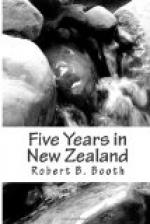Mr. Brand did not think much of Moorhouse’s spec. He had seen the country, but had not been on it, and did not think it good or extensive enough to be worked alone. He offered not only to lend us a fine boat for the remainder of the journey, but to accompany us himself to the forest which was adjacent to our quest, having to convey some stores to his men there. It was arranged that on the third day we would proceed thither, and in the meantime I lent a hand at anything going on, and amused myself sketching, an occupation I was very fond of, and I had already collected a considerable number of views taken on the Rangitata and other places.
We left in the afternoon, intending to camp about ten miles up. We numbered five in all, and the boat was fairly well laden with stores for the forest. The pull was a stiff one and we took no sail, the wind at this season always blowing down the lake. It was some time after dark when we reached our proposed camping place, a narrow strand of white shingle sprinkled with clusters of shrubbery backed with thick underwood, which afforded shelter and firewood. The boat was made fast, and materials for supper and a huge fire were speedily under weigh. We were much pestered here with weekas (woodhens) who carried off most of our food which was not securely covered by night. These birds are the most persistent thieves, nearly as large as a common fowl, of a browny colour, gamy looking, with long legs and very short wings, the latter only serving to assist them in running, for they cannot fly. They are to be found in every New Zealand bush, and unless travellers take the precaution to place provisions or any articles, edible or not, out of their reach, they will not long remain in ignorance of their proximity. When living in the forest I have frequently amused myself killing these birds in the following manner, while sitting at my camp fire at night. I procured two short sticks, at the end of one I attached a bit of red cloth or rag to be used as a lure. They are the most curious birds in existence, and this together with their thieving propensities is so powerful that when their desires for appropriation are excited they possess little or no fear. I would sit by the fire holding out the red rag, when in a few moments a slight rustle would be heard from the branches. After a little the bird would step boldly into the open firelight stretching his neck and cocking his head knowingly as he approached in a zig-zag way the object of his curiosity and desire.
So soon as he would come sufficiently near, and his attention was taken up with the bright object he hoped to possess, whack would descend the other stick on his head, and his mortal career of theft was at an end. Then I would roast the two drumsticks, having separated them from the body, skinning them, and eating them for supper; they are the only part of the bird fit for food.
The remainder of the body is boiled down for oil, which is invaluable for boots of any kind, making them waterproof and pliable.




